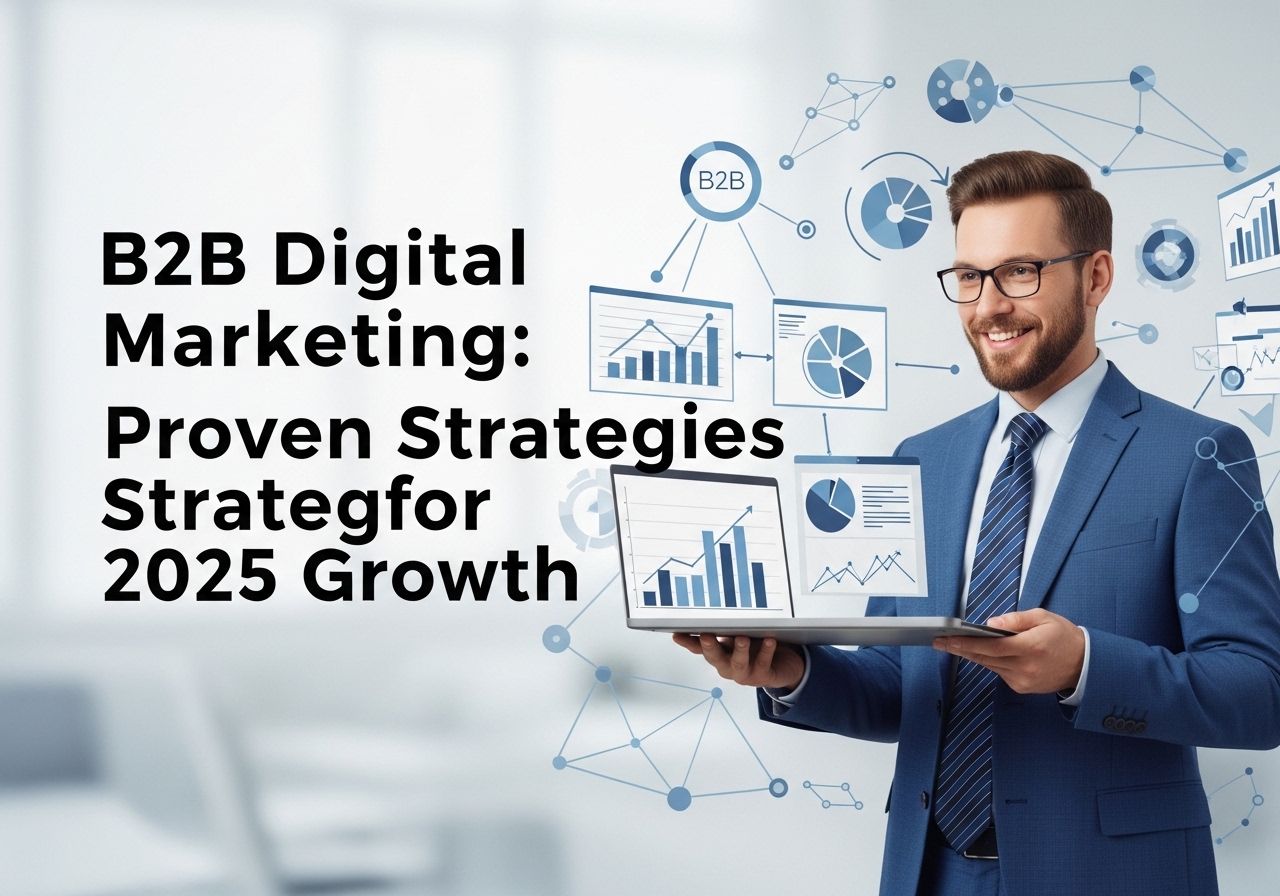Unlock Growth: How Data Drives Marketing Wins in 2025!
In today’s hyper-competitive digital landscape, a shocking 64% of marketing executives now “strongly agree” that data-driven marketing is crucial for business success. Yet, many businesses continue to make marketing decisions based on gut feelings rather than concrete evidence. Consequently, in 2025, this approach isn’t just outdated—it’s potentially business-ending.
The Evolution of Evidence-Based Marketing
Evidence-based marketing has transformed from a competitive advantage to an absolute necessity. Specifically, it’s the practice of basing ALL marketing decisions on data and analytics rather than intuition or assumptions. This approach, therefore, ensures that every dollar spent on marketing delivers measurable results and maximizes ROI.
What Exactly Is Evidence-Based Marketing?
At its core, evidence-based marketing means letting data guide your strategy. Instead of running campaigns because “they feel right,” you analyze real-world data to determine which messages, channels, and assets actually drive business results. For instance, consider this scenario.
Your e-commerce business receives substantial traffic from Instagram, making it tempting to increase investment there. However, upon examining your analytics, you discover that Instagram traffic has a high bounce rate and low conversion rate. Meanwhile, Google Search traffic, though smaller in volume, shows longer engagement times and higher conversion rates. Thus, the evidence-based approach would direct more resources toward SEO rather than social media, despite the surface-level traffic numbers.
Why 2025 Is the Turning Point
The marketing landscape has fundamentally changed. With unstructured data expected to account for 80-90% of global data in 2025, organizations that can effectively harness this information gain a significant competitive edge. Moreover, research by Deloitte shows that organizations using data visualization tools improve their data-driven decision-making by up to 28%.
The bottom line? Evidence-based marketing is no longer optional. Indeed, in 2025, it’s a requirement for any business that wants to maximize ROI and drive meaningful results. For more insights on current trends, you can explore the CDM Suite blog.
The Data Revolution: 5 Types of Marketing Data You Need in 2025
Successful evidence-based marketing relies on collecting and analyzing the right types of data. Therefore, here are the critical data categories that should inform your marketing decisions:
1. Customer Behavior Data
This includes website analytics, click-through rates, conversion paths, and engagement metrics. By understanding how customers interact with your digital properties, you can effectively optimize the user experience and conversion funnel.
2. Conversation Analytics
Phone conversations contain rich, qualitative data that reveals your audience’s true needs, desires, and pain points. Furthermore, using AI to analyze call recordings can uncover:
- Specific motivations and objections driving customer decisions
- Real-world language customers use to describe their needs
- Emotional undercurrents influencing purchase decisions
This deeper understanding enables genuine personalization that resonates on a personal level.
3. Market and Competitive Intelligence
Understanding your position in the marketplace relative to competitors provides crucial context for marketing decisions. For example, this includes analyzing competitor strategies, market trends, and industry benchmarks.
4. Campaign Performance Data
Tracking the performance of your marketing campaigns across all channels gives you visibility into what’s working and what isn’t. Consequently, this allows you to double down on successful tactics and pivot away from underperforming ones.
5. Customer Feedback and Sentiment
Direct customer feedback through surveys, reviews, and social media sentiment analysis provides invaluable insights into customer satisfaction and areas for improvement. This feedback is crucial for refining your strategies.
Implementing an Evidence-Based Marketing Strategy: A 4-Step Framework
Transitioning to an evidence-based approach requires a systematic framework. Here’s how to implement it effectively, ensuring your efforts are structured and impactful:
1. Integrate Data Sources Into a Centralized Analytics Platform
The first step is consolidating your data from disparate sources into a unified view. This integration enables comprehensive analysis and, importantly, prevents siloed decision-making. Modern marketing teams need a central source of truth where all marketing data lives and can be easily accessed from platforms like those offered by CDM Suite.
2. Perform Consistent Testing and Optimization
Evidence-based marketing thrives on continuous experimentation. Therefore, implement regular A/B testing across:
- Email subject lines and content
- Landing page layouts and copy
- Ad creative and targeting parameters
- Call-to-action placement and wording
Each test should have clear hypotheses and success metrics. Subsequently, document learnings and apply them to future campaigns.
3. Interpret Your Analytics With Context
Data without context is just numbers. Effective evidence-based marketing requires understanding the “why” behind the metrics. This means:
- Looking beyond surface-level metrics to deeper insights
- Considering external factors that might influence results
- Comparing results against historical performance and industry benchmarks
- Identifying correlations between different data points
4. Institutionalize a Data-Driven Culture
Perhaps the most challenging but crucial step is building a culture where data drives decision-making at all levels. This involves:
- Training team members on data analysis and interpretation
- Establishing data-driven KPIs for all marketing initiatives
- Celebrating wins based on data-backed improvements
- Encouraging questioning of assumptions with data requests
As DOIT Software reports, 80% of business leaders attribute improved decision-making to data access. Indeed, the democratization of data analysis is empowering more individuals, even non-experts, to engage deeply with research.
Common Pitfalls in Evidence-Based Marketing (And How to Avoid Them)
While the benefits of evidence-based marketing are clear, there are several common mistakes that can undermine your efforts. Awareness is the first step to avoidance.
Relying on Outdated Data
Marketing moves quickly. That oft-quoted statistic about “67 percent of the buyer’s journey happening digitally” is from 2013—ancient history in marketing terms. Therefore, ensure you’re basing decisions on recent, relevant data.
Misinterpreting Correlation as Causation
Just because two metrics move together doesn’t mean one caused the other. Always look for additional evidence before making causal claims. Critical thinking is essential here.
Analysis Paralysis
While data is essential, waiting for perfect information can lead to missed opportunities. Consequently, establish clear decision-making frameworks that balance evidence with timeliness.
Ignoring Qualitative Insights
Numbers tell only part of the story. Therefore, complement quantitative data with qualitative insights from customer interviews, sales team feedback, and social listening.
The Future of Evidence-Based Marketing: 2025 and Beyond
Looking ahead, several trends will shape the evolution of evidence-based marketing. Staying informed is key to staying ahead.
AI-Powered Predictive Analytics
AI will increasingly move from descriptive analytics (what happened) to predictive analytics (what will happen) and prescriptive analytics (what should we do about it). This evolution will allow marketers to anticipate customer needs and market shifts before they occur. Learn more about AI in marketing from Forbes Advisor.
The Video Revolution in Research
By 2025, video is projected to account for 82% of all internet traffic. This “TikTokification” of content is reshaping how marketing research is conducted and communicated. As a result, expect concise, visual data presentations to replace lengthy reports.
Rise of “Citizen Data Scientists”
The democratization of data analysis tools is creating a new class of marketing professionals who can perform sophisticated data analysis without specialized training. This trend is consequently redefining how organizations leverage insights.
Ethical Considerations in Data Usage
As data collection becomes more sophisticated, ethical considerations around privacy and consent will become increasingly important. Sustainable, ethical data practices will therefore be essential for long-term success.
The Benefits of Ethical, Evidence-Based Marketing
Committing to ethical, evidence-based marketing practices offers several significant advantages. These benefits contribute to sustainable growth and a positive brand image.
Sustainability: Ethical, data-driven strategies provide long-term, sustainable results, unlike short-term tactics that can lead to penalties or diminishing returns.
Enhanced Reputation: Furthermore, ethical practices build trust among consumers, strengthening your brand’s reputation in the marketplace.
Improved User Experience: Moreover, evidence-based approaches naturally lead to better user experiences, which increase site traffic and conversions.
Conclusion: Taking Action on Evidence-Based Marketing
The shift to evidence-based marketing isn’t just a trend—it’s a fundamental transformation in how successful businesses operate. In 2025, the organizations that thrive will be those that effectively harness data to drive marketing decisions.
Starting this transformation doesn’t require a complete overhaul of your marketing operations overnight. Instead, begin by identifying your most critical marketing decisions and ensuring they’re backed by solid evidence. Gradually expand this approach across your entire marketing function.
Remember, the goal isn’t perfect information—it’s better decisions that drive business results.
Ready to transform your marketing approach? Don’t leave your strategy to chance. Find out EXACTLY what’s missing in your marketing strategy with CDM Suite’s free 3-minute marketing assessment and get a custom growth plan tailored to your business. Take the assessment now!



